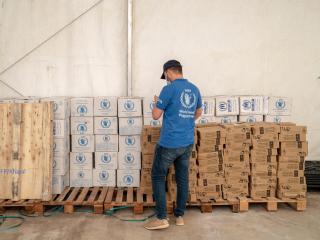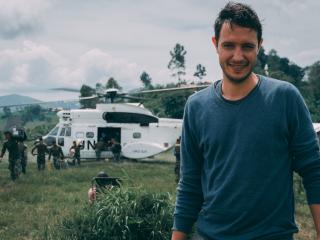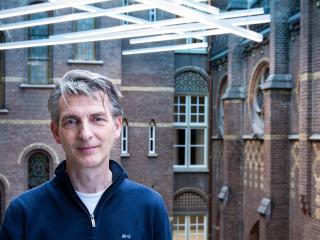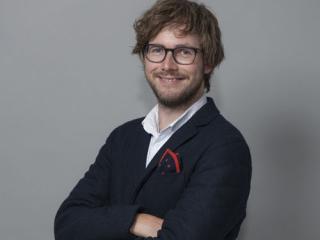Hezha Mohammed Khan, an offline influencer
She grew up during the war in Iraq. After a journey across the globe, alumna Hezha Mohammed Khan arrived in Tilburg and now works at the Zero Hunger Lab. Here she conducts research on childhood hunger. In addition, she is committed to helping young people in the Middle East. "Being able to make a difference is so rewarding."
Hezha Mohammed Khan was born in 1991 in Sulaymaniyah, in the Kurdistan Region of Iraq. To say that there was a better time and place to be born is putting it mildly. Hezha explains, “In 1991, there was a revolution in Kurdistan. Thousands of Kurds were forced to flee. My mother was six months pregnant with me. For three days in a row, she walked - carrying me and with four children in tow. I grew up at a time when the United States were imposing sanctions on Iraq. And Iraq, in turn, had imposed sanctions on Kurdistan. It was a time of widespread starvation and poverty. I can hardly remember that myself, but my mother has often talked about it. Things improved after the Iraq War of 2003. There was a boost in the economy, more food was available my father was earning more, and we were able to travel peacefully between cities of Iraq. We also received passports, you cannot imagine how special that was.”
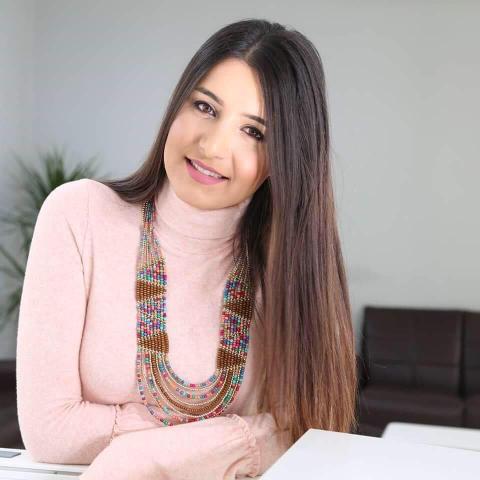
At home, school and studying were always encouraged
Nonetheless, it was a few years before Hezha flew to America. In the meantime, she concentrated fully on her studies. When she was eight years old, she heard about a local private school. It was only accessible to outstanding pupils and, of course, it was not free. Hezha was admitted to the school when she was twelve. “From that time, my life was all about school and studying. It was something I really enjoyed. At home too, we were always encouraged to do well at school. All my brothers and sisters went on to study at university, although I was the only one in our family to go to a private school. My father could not afford to send more children there. I have to say it rather suited me, because I wanted to be different than everyone else. More importantly, I would learn English there which would enable me to communicate and work outside Iraq.’’
Turnaround
When she was seventeen, Hezha was selected to take part in the Iraqi Young Leaders Exchange Program in the United States. The program, which lasted four weeks, turned her whole life around. “At that time, I had only been to Kirkuk and to Erbil, the capital of Kurdistan. That was all I had ever seen of the world. I remember arriving in California and thinking, why do we live as we do, when it could all be like this? We were taught at UCLA, given a guided tour of the Capitol, and I was allowed to sit on Hillary Clinton’s chair. It was magical.”
You do not have to be the president to bring about change
Back in Kurdistan, Hezha started doing voluntary work for USAID and relief international, working on a campaign to raise awareness on civil rights. Looking back, she now says that this is not something people were ready for. “Nobody understood exactly what we were doing. Still, it felt good to get involved with something that we could use to change things. At the time, I decided I wanted to be the first female president of Iraq. I even created an email address for the purpose: PresidentHezha@yahoo.com. But simply through experience, I learned that you do not have to be the president to bring about change.”
Leadership training course
Several years later, and with a grant from the U.S. Department of State, Hezha launched a leadership training course for people with an impairment. Not long afterwards, she established the American Private Center, an institute where young people between the ages of fourteen and sixteen could acquire skills that they were not learning at their own school.
Hezha explains, “During an eighteen-month course, we provided English lessons for 75 students. They learned how to speak in public, for example, how to deal with conflicts, and they learned debating skills. This program was also funded by the American State Department. We also gave lessons and workshops that we funded ourselves.”
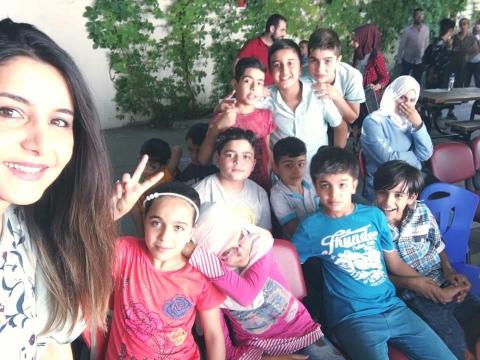
Het geeft zoveel voldoening als je verschil kunt maken
“One day, the bus driver who drove the students spoke to me. He said, ‘What are you doing with all these children? The first time they were on my bus, they almost completely wrecked it. They fought and argued and left all their rubbish behind. Now, they turn up on time, they have civilized discussions, and say please and thank you.’ Thinking back on that now makes me tear up. Being able to make that kind of difference is so rewarding. In total, about three hundred children took the program. Some of them went on to set up their own volunteer organizations and others have taken part in the same exchange program that I went on.”
Recognizing shortcomings
At the same time, Hezha was concentrating on her own studies. She gained a degree in electrical engineering in 2015 and took part in courses and workshops at various organizations. After 2016, she found herself traveling abroad more often, attending conferences as a speaker or taking part in training courses. “I was part of UNESCO Youth, I went to Baku to speak about young people, peace, and conflicts, and I spent time working for the German development agency, GIZ. Over the years, I have fulfilled a great number of different roles at various organizations and companies. From a Dutch perspective, they may not appear to have much in common with each other, but taken from the point of view of Kurdistan, then there are definitely similarities. They taught me to recognize society’s shortcomings. I give my vision for a particular situation, mobilize other young people to work on it, and then move forward.”
I had been living continuously among conflicts, economic crises, unemployment, and poverty
A break from Iraq
If you had asked the 10 years old me, she would never have dared to dream that she would see so much of the world and meet so many interesting people. Her activities garnered the attention of major companies and political parties, but being rich and powerful was never her ambition. “Money can’t buy what I have experienced,” she says. Nonetheless, after four years traveling around, she decided it was time to settle down. “I was married by this time and wanted to do a Master’s program. Preferably somewhere abroad, because of the quality of the teaching, but also because I needed a break from Iraq. I had been living continuously among conflicts, economic crises, unemployment, and poverty. I had little reason to complain personally, but the people I was working with were suffering in this environment. And that really gets to you. Conditions like that are not good for your mental health. What I really wanted to do was combine my academic background with social work."
"I enrolled in the master's program Data Science and Society at Tilburg University. I started the program in 2019. After a time, my path crossed with that of professor Hein Fleuren of the Zero Hunger Lab. The lab investigates how artificial intelligence (AI) and data science could be used to tackle worldwide starvation. Zero Hunger Lab works in partnership with various organizations, looking for innovative solutions. For example, it has optimized the supply chain in crisis situations for the World Food Programme. This was exactly what I was looking for. I said I wanted to do my Master’s thesis at Zero Hunger Lab. Professor Fleuren was very helpful and put me in touch with Professor Eric Postma, under whose supervision I wrote my Master’s thesis on the Child Growth Monitor. For me, it is a great privilege to be able to work with such astute people.”

Virtual child health clinic
“Last October, I started my PhD research into the Child Growth Monitor. This innovative project was launched by our partner, Welthungerhilfe. Together, we are developing an algorithm that scans a body, from which it derives parameters like height, waist size, and weight. You could call it a virtual child health clinic."
"People in rural areas have no health clinics and they do not always possess the knowledge to assess whether their children are growing properly or not. This tool helps highlight malnutrition. It can also be used for gathering statistical data. And that helps aid organizations to identify areas of starvation. The great thing as far as I am concerned is its durable impact. It may not immediately help children who are starving today, but in ten years’ time, it really will make a difference. All of Zero HungerLab’s projects offer long-term solutions to research questions.”
In the Netherlands, Hezha is still active in social projects in the Middle East. She approached the Dutch Ministry of Foreign Affairs with the idea for the Equipping Young Peacemakers program. The program gives 35 young people from the Middle East the opportunity to learn how to use data and statistics to raise their work to a higher level, and thereby contribute to sustainable development goals (SDGs). The program is part of AMENDS Global Fellows and Shughel Shabab, of which Hezha is a fellow and co-founder respectively.
Influencer
Hezha very much enjoys having an impact on other people’s lives. She would like to be an influencer - not the kind you see on Instagram, but someone who improves the lives of others from behind the scenes. When asked, she says it was Oprah Winfrey and Hillary Clinton that she looked up to as a girl. Nowadays, there are many more working women who inspire her. “Every day, I receive messages from women and girls around the world who tell me that I am inspiring them. That is fantastic, but it also adds pressure. I don’t want to make any mistakes. In the Middle East, having a good family is more important than a successful career. I would like to show girls that both are possible. That’s why I do my very best to be a good woman, and good mother, and a good citizen.”
More about Hezha
Hezha Mohammed Khan, 29, is a TEDx speaker and AMENDS partner. She studied electrical engineering at the University of Sulaimani in Iraq. In 2020, she completed her Master’s in Data Science and Society at the Tilburg School of Humanities and Digital Sciences. During her studies, she worked as a researcher at Tilburg University’s Zero Hunger Lab. Also in 2020, she embarked on her PhD research, on the Zero Hunger Lab’s Child Growth Monitor project. Away from her work, she is currently actively involved with the Equipping Young Peacemakers program, which focuses on young people in the Middle East. Hezha is also a mother. In August, she give birth to a beautiful baby boy, Aran.
Date of publication: 21 January 2021

